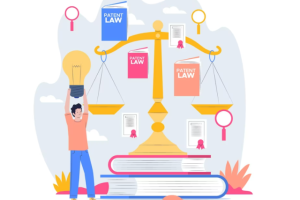
The Role of Jurisprudence in the Interpretation of the Law

Jurisprudence is the study and philosophy of law. It plays a critical role in understanding the law and its interpretation. It encompasses legal theory and practice, examining the principles and reasoning that underpin the law. The application of jurisprudence shapes the development of legal systems, influences legal analysis, and navigates complex intersections with morality.
Legal professionals employ jurisprudential analysis to interpret laws, make arguments, and shape legal outcomes. Understanding jurisprudence is crucial in comprehending how legal systems operate and evolve. Explore the significance of jurisprudence in the interpretation of the law, its relationship with legal philosophy and theories, and its practical application in legal practice.
- Understanding Jurisprudence: Exploring Legal Philosophy and Theories
- The Significance of Legal Analysis in Jurisprudence
- Jurisprudence and the Development of Legal Systems
- Jurisprudence and the Intersection of Law and Morality
- Jurisprudence in Practice: Applying Legal Theory in the Real World
- Critiques and Challenges to Jurisprudence
- Contemporary Debates in Jurisprudence
- The Future of Jurisprudence
Understanding Jurisprudence: Exploring Legal Philosophy and Theories
Jurisprudence is a vital aspect of the study and practice of law. It involves the examination and interpretation of legal principles, theories, and philosophies that inform the development and evolution of legal systems. In this section, we will delve deeper into the concept of jurisprudence, exploring its relationship with legal philosophy and various legal theories.
Legal Philosophy
Legal philosophy is the study of the fundamental principles that govern the law. It seeks to understand the nature of law, its purpose, and its role in society. Legal philosophers explore various philosophical approaches to the law, including natural law, legal positivism, and legal realism.
Natural law theorists believe that the law is based on universal moral principles and that legal systems should reflect these principles. Legal positivists, on the other hand, argue that the law is simply the product of human-made rules and regulations. Legal realism takes a more pragmatic approach, emphasizing the importance of context and interpretation in the study and application of the law.
Legal philosophy plays a crucial role in shaping jurisprudence, as legal theorists draw on philosophical insights to inform their understanding of legal concepts and principles.
Legal Theories
Legal theories provide frameworks for understanding the law and its application. There are many different legal theories, each with its own approach to interpreting and analyzing legal concepts.
One key legal theory is legal formalism, which emphasizes the importance of strict adherence to legal rules and precedents. Another is legal realism, which emphasizes the importance of context and interpretation in legal analysis. Critical legal studies, feminist legal theory, and law and economics are other prominent legal theories.
Jurisprudence involves a deep understanding of legal theories and their implications for legal practice.
Legal philosophy and theories are essential components of jurisprudence. They provide the intellectual underpinnings for the study and practice of law, informing legal principles, legal reasoning, and legal interpretation. Understanding legal philosophy and theories is key to mastering the field of jurisprudence.
The Significance of Legal Analysis in Jurisprudence

Legal analysis is a cornerstone of jurisprudence, and its importance cannot be overstated. It allows legal professionals to examine and interpret legal concepts, case law, and statutes in a systematic and rigorous manner.
There are several methodologies that legal analysts employ in their work. One common approach is the use of precedent, where past legal decisions are used to guide current cases. Another is textualism, where statutes and legal texts are interpreted based solely on their plain meaning. A third approach is purposivism, where the purpose or intent behind the law is taken into account in its interpretation.
Legal analysis requires a deep understanding of legal concepts and theories. It involves careful examination of legal texts, consideration of relevant legal precedents, and application of legal reasoning and logic. Without rigorous legal analysis, the interpretation and application of the law could become overly subjective and arbitrary, leading to unequal and unjust legal outcomes.
Furthermore, legal analysis is not limited to legal professionals. Anyone can engage in legal analysis in their daily lives, whether it be in interpreting a contract or understanding their legal rights and obligations. By utilizing the tools and methodologies of legal analysis, individuals can make more informed legal decisions and better understand the complex legal system.
Jurisprudence and the Development of Legal Systems
Jurisprudence plays a pivotal role in the development and evolution of legal systems around the world. Legal systems are dynamic and constantly changing, and jurisprudence contributes to this change by providing new insights and perspectives on legal principles and theories.
Legal frameworks are shaped by a variety of factors, including historical context, social and political conditions, and cultural norms. However, jurisprudence also plays a significant role in this process, as legal theories and principles inform the formation of legal frameworks. For example, the development of modern constitutional law in the United States was heavily influenced by jurisprudential theories regarding individual rights and freedoms.
| Legal System | Jurisprudential Influence |
|---|---|
| Common Law | Judicial decisions based on legal precedent and interpretation |
| Civil Law | Jurisprudential analysis of statutes and codes |
Legal systems are not static and are constantly evolving, and jurisprudence is a driving force behind this evolution. As new legal issues arise and societal values shift, jurisprudential theories and principles are used to shape legal frameworks that reflect these changes. For example, the evolving understanding of individual rights and freedoms has led to changes in laws regarding privacy, free speech, and discrimination.
Overall, jurisprudence is a crucial component of legal development and evolution. By providing new insights and perspectives on legal principles and theories, jurisprudence is instrumental in shaping legal systems that reflect the values and needs of society.
Jurisprudence and the Intersection of Law and Morality
Jurisprudence is concerned not only with the technical aspect of the law but also with the moral dimension of legal decision-making. The relationship between law and morality has been a subject of debate among legal theorists for centuries. While some argue that the law is inherently moral, others contend that law and morality are entirely separate entities.
“It is not desirable to make a distinction between law and morality, because they do not differ in nature but only in the aspect of application.” - Aristotle
Legal theorists have explored various approaches to understanding the relationship between law and morality. One such approach is natural law theory, which posits that the law should be based on moral principles that are inherent in human nature. In contrast, legal positivism asserts that law is separate from moral considerations and is derived solely from social sources, such as statutes or case law.
Some theorists argue that morality plays a role in the interpretation and application of the law, particularly in cases where the law is unclear or conflicts with moral principles. This view is supported by the principle of equity, which allows for judges to consider moral considerations when making decisions.
“The law, like the suburban American house, is designed to order a particular pattern of relationships, many of them oriented around the heterosexual nuclear family. For real people in contemporary circumstance, real houses involve a whole array of relationships that cannot be regulated by law.” - Donna Haraway
However, the intersection of law and morality can also pose challenges in legal analysis and decision-making. The subjective nature of moral principles can lead to differing interpretations and inconsistent outcomes. Furthermore, the incorporation of moral considerations in legal decision-making can raise questions about judicial impartiality.
Despite these challenges, the relationship between law and morality remains a significant area of inquiry in jurisprudence. The intersection of these two fields continues to shape legal theory and practice, highlighting the ongoing need for a nuanced understanding of their complex relationship.
Jurisprudence in Practice: Applying Legal Theory in the Real World
Jurisprudence is not just an abstract concept studied in law schools; it also plays a critical role in shaping legal outcomes in the real world. Legal professionals use jurisprudential principles and theories to analyze and interpret laws, make arguments, and influence legal decisions.
Jurisprudential analysis is particularly relevant in common law systems, where decisions made in previous cases set precedents that inform future legal rulings. In these cases, legal professionals use jurisprudence to interpret the law, identify relevant precedents, and craft arguments based on legal principles and theories.
Legal scholars and practitioners use various methodologies to apply jurisprudence in practice. One common approach is the syllogistic method, which involves constructing legal arguments based on deductive reasoning. Another method is the doctrinal method, which focuses on analyzing legal texts, including statutes and case law, in order to identify relevant legal principles and rules.
Legal professionals also use jurisprudence to navigate ethical and moral dilemmas. For example, in cases where the law conflicts with moral principles, lawyers may use jurisprudential analysis to argue for a more ethical interpretation of the law. Similarly, judges may rely on legal theories and principles to guide their decisions when faced with difficult ethical considerations in a case.
| Key takeaways: |
|---|
| Jurisprudential analysis is a critical tool for legal professionals in interpreting the law and shaping legal outcomes. |
| Legal professionals use various methodologies, including the syllogistic and doctrinal methods, to apply jurisprudence in practice. |
| Jurisprudence can help legal professionals navigate moral and ethical dilemmas in the law. |
Critiques and Challenges to Jurisprudence
Jurisprudence, like any field of study, is not without its criticisms and challenges. While legal theorists engage in ongoing debates and discussions, certain critiques have persisted throughout history.
One of the most fundamental critiques of jurisprudence is its reliance on abstract legal concepts and theories. Critics argue that this approach can be detached from the reality of legal practice and can obscure the practical effects of legal decisions on real people and communities.
Another challenge to jurisprudence is the complexity of applying legal theory to real-world situations. While legal theorists may formulate elegant arguments and principles, applying those concepts to the messy details of actual cases can be difficult.
“The complexities of the legal system are often such that legal principles do not translate into clear and easily applicable rules.”
Furthermore, there are critiques of specific legal theories that fall under the umbrella of jurisprudence. For example, critical legal studies argue that the law is inherently political and that legal decisions are shaped by power dynamics rather than pure logic or reasoning. Feminist jurisprudence similarly critiques traditional legal concepts for ignoring the experiences and perspectives of women and other marginalized groups.
Overall, these critiques and challenges highlight the ongoing nature of the study of jurisprudence. As legal systems and societies continue to evolve, so too will the theories and concepts used to analyze them.
Contemporary Debates in Jurisprudence

Jurisprudential analysis continues to evolve, and with it come ongoing debates and discussions in the legal community. Some contemporary issues facing jurisprudence include:
- Legal Realism: This school of thought challenges the notion that law is an objective set of rules and argues that it is shaped by social and economic factors.
- Critical Legal Studies: This movement critiques traditional legal analysis and argues that the law is often based on power dynamics and biases.
- Feminist Jurisprudence: This branch of jurisprudence explores the role of gender in the law and legal systems, examining how law can be used to promote gender equality.
Another contemporary debate in jurisprudence is the role of artificial intelligence (AI) in legal decision making. This raises questions about the appropriate use of technology in legal practice and its potential impact on the role of lawyers and judges.
Despite these debates, the study and practice of jurisprudence remain critical to the development and understanding of the law. As legal systems continue to evolve, it is likely that new debates and discussions will arise, further shaping the field of jurisprudence.
The Future of Jurisprudence
Jurisprudence plays a fundamental role in understanding and interpreting the law. Its significance in legal theory and practice cannot be overstated, as it shapes legal principles, reasoning, and interpretation.
As legal philosophy and theories continue to evolve, so does the study of jurisprudence. Looking ahead, the future of jurisprudence is likely to see continued interdisciplinary collaboration with fields such as sociology, political science, and economics, in order to better understand the broader social and economic implications of legal systems and practices.
Moreover, with the rise of emerging technologies such as artificial intelligence and blockchain, new legal challenges are likely to arise, requiring innovative approaches to jurisprudential analysis.
Challenges and Opportunities
While there are certainly challenges ahead for jurisprudence, including critiques of certain legal theories and difficulties in applying jurisprudential analysis to complex legal cases, there are also significant opportunities for growth and progress.
With ongoing debates and discussions within the field, as well as emerging legal theories and approaches, the future of jurisprudence promises to be an exciting and dynamic space for legal scholars, professionals, and practitioners.
In summary, as legal systems and practices continue to evolve, the study of jurisprudence will remain a crucial tool for understanding and interpreting the law, shaping legal frameworks, and contributing to broader social and economic discussions.
If you want to know other articles similar toThe Role of Jurisprudence in the Interpretation of the Law You can visit the categoryLAW STUDY.
Leave a Reply









It may interest you...